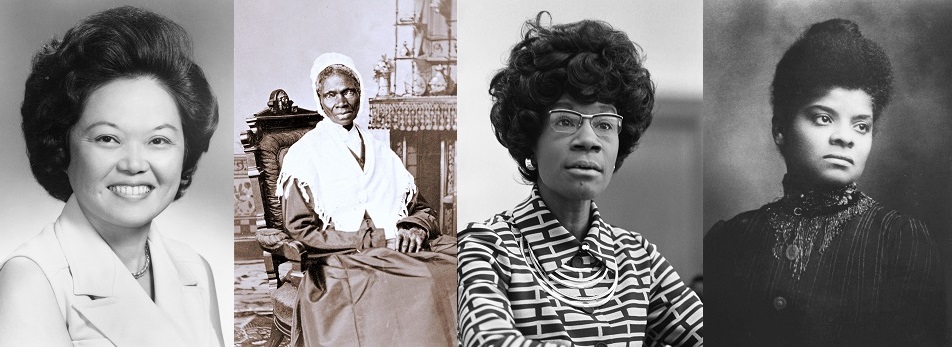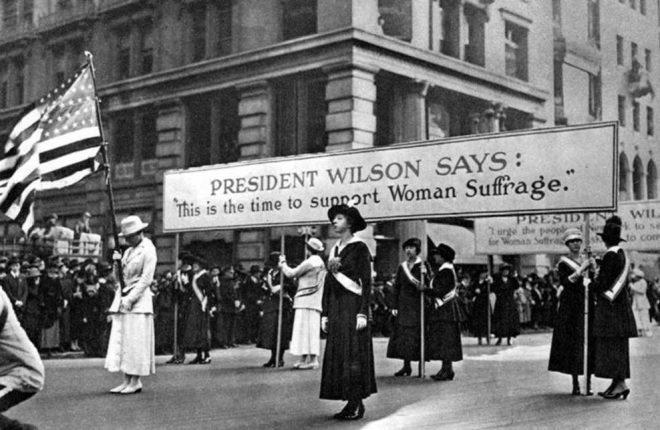Blog by Jovida Hill, Executive Director of the Philadelphia Commission for Women
Less than 100 years ago, in most states across America, women could not vote. For a large part of our country’s history, women were without a right fundamental to democracy.
That changed with the passage and ratification of the 19th Amendment to the U.S. Constitution in 1920, a law certified on August 26, 1920. Now, we commemorate August 26 each year as Women’s Equality Day.
This year, we asked members of the Kenney Administration who they thought of when they reflected on Women’s Equality Day. Here are some of their answers!

Deputy Mayor for Public Engagement Nina Ahmad thinks of Patsy Mink.
“It is easy enough to vote right and be consistently with the majority. But it is more often more important to be ahead of the majority and this means being willing to cut the first furrow in the ground and stand alone for a while if necessary.” — U.S. Rep. Patsy Mink
“She was an outspoken defender of principles she believed in,” explains Nina. “In 1964, Mink was the first Asian American woman elected to Congress representing Hawaii. She served 12 terms spanning nearly 40 years, passing away in the middle of her thirteenth term. Mink was an early supporter of a successful effort to allow female members of Congress to use the heretofore all-male House gym! Her greatest legislative accomplishment, though, was passage of Title IX, which prohibited gender discrimination in all federally funded educational institutions. One of Title IX’s most significant results was the considerable growth of women’s athletic programs in schools and colleges!”
Director of the Office of Benefits and Wage Compliance in the Mayor’s Office of Labor Crystal Miller thinks of Sojourner Truth.
“If my cup won’t hold but a pint, and yours holds a quart, wouldn’t you be mean not to let me have my little half measure full?” — Sojourner Truth
“At ten years old, I was immediately taken with Sojourner Truth’s ‘Ain’t I A Woman’ speech,” Crystal says. “Her life of activism and advocacy for women’s rights and for rights of all Black people inspired me to stand up for what I believe in and empowered me to pursue my goals and dreams – regardless of gender or race.”
Mayor’s Office of Labor Chief-of-Staff Manny Citron thinks of Shirley Chisholm.
“At present, our country needs women’s idealism and determination, perhaps more in politics than anywhere else.” — U.S. Rep. Shirley Chisholm
“The first African American woman elected to Congress, Shirley Chisholm served seven terms in office from 1969 to 1983,” explains Manny. “In 1972, Chisholm became the first African American to run for a major party’s nomination for U.S. president, too. Her single candidacy helped pave the way for two other historic major party presidential nominations: those of Barack Obama and Hillary Clinton.”
Deputy Communications Director Ajeenah Amir thinks of Ida B. Wells-Barnett.
“Brave men do not gather by thousands to torture and murder a single individual, so gagged and bound he cannot make even feeble resistance or defense. Neither do brave men or women stand by and see such things done without compunction of conscience, nor read of them without protest.” — Ida B. Wells-Barnett
“Communicator, suffragist, wife, and mother Ida B. Wells-Barnett is a woman in public service I most admire,” Ajeenah says. “Through her work, Wells exposed America to the frequency of lynching of African Americans. She traveled throughout the South documenting cases, often at risk of personal peril, and published reports that she then used to advocate for federal anti-lynching legislation. She also distributed her findings throughout the African American community nationwide by way of self-published newspapers, the Black press, and pamphlets. At the same time,” Ajeenah adds, “she was a fierce advocate for voting rights for women and, for a time, worked alongside her contemporaries Susan B. Anthony and Elizabeth Cady Stanton for the cause.”
Do you have a question about the Philadelphia Commission for Women — or an idea you’d like to share with the Commission? Contact Executive Director Jovida Hill at jovida.hill@phila.gov or let the Mayor’s Office know on Twitter!

